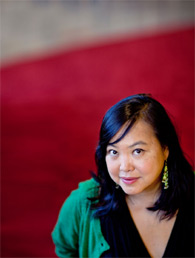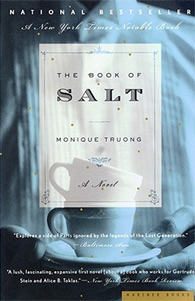This year’s Singapore Writers Festival was held 2 to 11 November. Despite the event’s links with government bodies, the whole affair turned out to be surprisingly LGBT-friendly.
The most prominently featured writer has been the openly gay Michael Cunningham, author of the lesbian-themed novel The Hours. Two collections of gay-themed poetry have been launched: Straw, Sticks, Bricks by Cyril Wong and The Invisible Manuscript by Alfian Sa’at. The Arts House even held a queer-themed panel: “Gender Bender: Love in the Age of Sexual Confusion” – though this was open only to participants aged 21 and older.

So you might be surprised that the author we’ve chosen to feature this year is a straight woman. Monique Truong is the bestselling author of The Book of Salt (2003) and Bitter in the Mouth (2010). Both these books feature LGBT characters – which is perhaps why she was invited to the “Sexual Confusion” panel, even though she adamantly pointed out that none of her gay and lesbian characters were at all confused about their desires.
The Book of Salt is set in 1920s Paris, in the household of famous lesbian writers Gertrude Stein and Alice B. Toklas. The main character, however, is Binh: a young gay Vietnamese cook who lives in their household. It’s from his point of view that the story is told: one of desire, exile and food.
The heroine of Bitter in the Mouth is quite different. Linda’s a girl growing up in a white Southern household in the small town of Boiling Springs, North Carolina. She’s born with a rare condition: whenever she hears a word, her senses are overwhelmed by the taste of a specific food. As a secret freak, one of her only friends is her gay great-uncle Harper, who provides her with wisdom and comfort throughout her coming of age.
This second novel is based on Truong’s own life story. She’s a Southern girl twice over, born in South Vietnam but bred in Southern America, where she struggled with being one of the only Asian faces in a sea of white.
But it’s The Book of Salt that’s really gained a cult following among LGBT folk. Its sensitive, compelling depiction of a gay Asian man caused it to be nominated for the Lambda Literary Award and to win the ALA Stonewall Book Award. It’s also done rather well as a mainstream bestseller – it’s even recommended by Lonely Planet Guidebooks as an excellent introduction to the history of Vietnam.
Before she flew home, I managed to sit down to speak with Truong about her life and work:
æ: ASL?
Monique: I was born in Vietnam in 1968. I identify as a straight woman, and I live in Brooklyn.
æ: Where in Vietnam were you born?
Monique: In Saigon. I left when I was six. I turned seven in Camp Pendleton in California. It was one of the big military camps in the States that were turned into relocation camps.
æ: How did you end up in your hometown of Boiling Springs?
Monique: My father had worked for Shell Oil. He and my mother really just wanted to leave the camps as quickly as possible so they could begin their lives again. So they contacted many people they knew in the US. None of them stepped forward to say they would sponsor us except one man – and unfortunately he lived in a very small town in the American South.
æ: You hated it, didn’t you?
Monique: I did. It was a really tough way to grow up. I didn’t have any siblings at that point and my parents were really not focused on what was going on with me: they were focused on trying to restart their lives.
I was thrown into this school environment where suddenly everything about me was problematic – my skin colour, I was told I was yellow, that my eyes were slits, that my hair was too black and too straight. It’s a very hard thing for anyone to go through, but especially for a child, because you don’t have any context to understand what’s going on. I remember being a child and looking at the mirror and going. “OK, I’m still the same, but everyone around me is looking at me as if I’m a monster of some kind.”
æ: You’ve mentioned that this gave you a certain kind of affinity with gay people.
Monique: I didn’t meet an openly gay person probably until high school. But I think what we realised what we had in common very quickly: there was just something profoundly different about us, at least from other people’s point of view. And we had to learn how to have coping mechanisms, survival skills.
A lot of us became incredibly studious, so we all ended up in all the same classes. So gradually you could see society separating us by the time we grew older. And by the time I got to Yale for college, I would have to say that it was one of the gayest campuses around.
æ: How did you become a writer?
Monique: When I graduated from law school, I started out as a litigator at a large law firm in New York. And I was miserable. I remember being inside of the library of the law firm in lower Manhattan – it had this beautiful view of the Statue of Liberty – and I remember standing there and looking at it and crying.
It was this realisation of what that statue meant to me, to so many people around the world, this idea of freedom. And there I was feeling like a caged animal. So I thought, “My family didn’t come to this country and risk everything just so that I could be this unhappy.” And I knew at that point I had to do something else I had to do something that would actually allow me to exist without crying every day. And thus a writer was born.
æ: How did you get the idea for The Book of Salt?

Monique: I think I read The Alice B. Toklas Cookbook when I was in college, for the hash brownie recipe – and it was not possible to make it because it involved a handful of cannabis sativa. I could not afford it. I don’t know how Toklas did it.
And I remember reading it and being surprised that it wasn’t just recipes. It was also memoir: she was writing about her life with Gertrude [Stein] and their daily lives in Paris. And I remember reading about “the Indochinese men” who worked with them, and I was really fascinated. I never forgot about them, though I didn’t start writing about them until maybe 1997.
That was when I was editing an anthology of Vietnamese-American poetry and prose – it’s called Watermark, it’s still in print. There were three editors and we decided we were going to submit works to be considered as well. I submitted something I had written in college and the other two rejected it because they said it wasn’t strong enough. That hurt, but I sat down and what came to me was ‘Seeds’, the short story that eventually became The Book of Salt.
æ: I think a lot of readers are surprised that you chose to make Binh a gay man.
Monique: Alice B. Toklas was at once very affectionate and very dismissive to [her Indochinese cooks] as men, as humans. And I thought there is so much more about this, so much more to these lives.
And when I sat down to write, what came to me was a gay man’s voice. I knew that from the beginning when I sat down to write. I knew he would be gay, I knew he would have a sharp sense of humour, I knew his thoughts would be beautiful and poetic in contrast to the fact that he had no facility in the languages of his environment: French and English. He’s not just a gay man – being gay is part of who he is, is part of his whole being.
æ: Could you tell us about the general response to this book?
Monique: The book sold extremely well – it was a national bestseller, it got these awards, it’s been translated into many languages. But the most important thing to me was how my fellow Asian American writers and academics reacted to it, because in all honesty I wrote for them.
In general writers will say they don’t write for anyone, or for a large grey public. I write for one person. He’s a queer Asian-American academic and his name is David Eng. He’s a fantastic literary scholar and he’s one of my first readers. In the case of The Book of Salt and Bitter in the Mouth, I knew I had done something that I really am proud of because David was very supportive from the very beginning.
æ: Has the book been translated into Vietnamese?
Monique: No. And it’s surprising, considering that it’s been translated into Hebrew, Slovenian, Portuguese… you name it. It’s even been translated into Chinese in mainland China as well as Taiwan.
But I think perhaps what’s happening in Vietnam is they’re afraid of a very particular portion of the book where I suggest that Ho Chi Minh could have been a gay man. I call him Nguyen Ai-Quoc, which was the pseudonym he used when he was a young man in France – but of course, everyone who knows about the history knows that was his identity.
It works differently in Vietnam as opposed to Vietnam and Vietnamese America. Because you know that to even reference Ho Chi Minh among Vietnamese Americans is to have your work boycotted and picketed. Anything that is not a scathing indictment of this person is to invite that.
And I feel like I didn’t get a lot of that criticism because, for a very conservative hardcore Vietnamese-American, if they see that I ‘m suggesting that Ho Chi Minh was a gay man, they think of it as a criticism, an insult to him. And that’s why they haven’t been saying I’m a Communist.
I’ve met Vietnamese who are living in NYC as expats and they’ve read the book and they’re very enthusiastic about it. They would like to get it translated and I know efforts have gone to get it translated. I don’t know why it hasn’t. I know copies of the American edition are available for sale there. But I would dearly like to see it translated.
æ: Any last thoughts to share with our readers?
Monique: The thing I would say is it is a real privilege to be invited to places because of my writing. And that’s the way that I’ve travelled the world since 2003. And it’s wonderful. And to be able to come to a place in Singapore and to know that I got here not because I could afford the plane ticket but because I wrote some words… I suppose I want to encourage people to know that a creative life is possible, and that you might never have a big savings account but you’ll have some really tremendous experiences. And in the larger scheme of things, it’s really a risk worth taking.
Learn more about Monique Truong at her website, monique-truong.com











 Printable Version
Printable Version




















Reader's Comments
I will definitely get the book and read it asap. Merci Fridae et Monique!
I will definitely get the book and read it asap. Merci Fridae et Monique!
It's a pleasure now to hear a bit from Monique Troung about her life and experiences. I'd never have guessed she had grown up in the US South, but it sure explains some things. Anyone who leaves the law for writing sure has things right-side up in my view. I'm really smiling. Thanks to Monique and to Fridae for bringing this to me.
Please log in to use this feature.